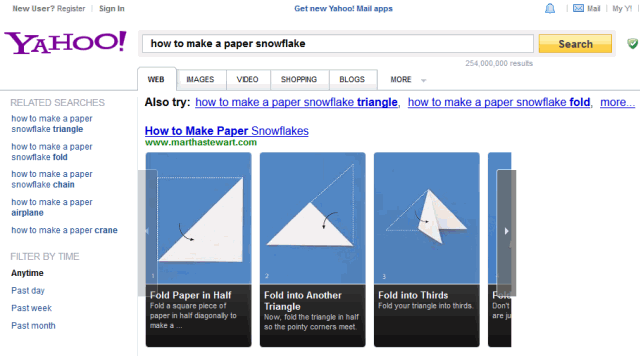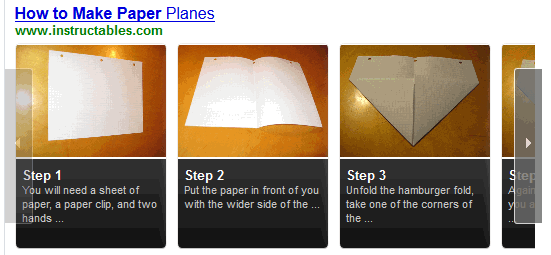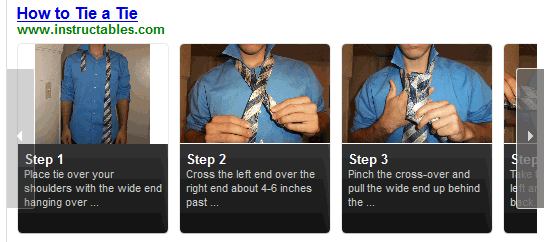How Rich Will Listings Get?
As Google has went from ad platform for illicit content (both ways) to host of illicit content & reseller of legit content, they have cracked down on competitors & are now trying to police the ability of other sites to accept payment:
The web search giant, which is embroiled in a long-running row over the way it deals with pirated material, is considering the radical measure so that it can get rid of the root cause instead of having to change its own search results.
Executives want to stop websites more or less dedicated to offering links to pirated films, music and books from making money out of the illegal material. The plans, still in discussion, would also block funding to websites that do not respond to legal challenges, for example because they are offshore.
While Google is partnering with big media (that has long had a multi-polar approach to copyright) Google continues to gain in a game of inches.
Last month Google announced a new format for their image search results, where they pull the image inline without sending the visitor onto the publisher website. At the same time they referenced some "phantom visitor" complaint from publishers to justify keeping the visitor on Google & highlighted how there were now more links to the image source. If publishers were concerned about the "phantom visitor problem" we wouldn't see so many crappy slideshow pageviews.
Google's leaked remote rater guidelines do mention something about rating an image lower under certain situations like where the author might want attributed for their work that they are routinely disintermediated from.
On Twitter a former Google named Miguel Silvar wrote: "If you do SEO and decide to block Image Search just because it's bringing less traffic, you can stop calling yourself an SEO expert."
Many "experts" would claim that any exposure is good, even if you don't get credit for it. Many clients of said "experts" will end up bankrupt! Experts who suggest it is reasonable for content creators to be stripped of payment, traffic & attribution are at best conflicted.
One of the fears of microformats was that as you add incremental cost to structure your data, the search engines may leverage your extra effort to further displace you. That fear turned out to be valid, as in the background Google was offering vertical review sites the "let us scrape you, or block Googlebot" ultimatum.
Google Shopping has shifted to paid inclusion & Google has made further acquisitions in the space, yet people still recommend that ecommerce sites get ahead by marking up their pages with microformats.
As Google continues to win the game of inches of displacing the original sources, they don't even need you to mark up your content for them to extract their knowledge graph. Bill Slawski shared a video of Google's Andrew Hogue describing their mass data extraction effort: "It's never going to be 100% accurate. We're not even going to claim that it is 100% accurate. We are going to be lucky if we get 70% accuracy ... we are going to provide users with tools to correct the data."
If you as a publisher chose to auto-generate content at a 70% accuracy, pumped it up to first page rankings & then said "if people care they will fix it" Google would rightfully call you a spammer. If they do the same, it is knowledge baby.
Eric Schmidt recently indicated that Google was willing to sacrifice relevancy to collect identity information. Their over-promotion of Google+ has become more refined over time, but it hasn't went way.
Google pays for default placement in Safari & Firefox. Former Google executives head AOL & Yahoo!. Google can thus push for new cultural norms that make Microsoft look like an oddball or outsider if they don't play the same game.
Google isn't the only company playing the scrape-n-displace game.
"The innovation in search is really going to be on the user interface level" - Marissa Mayer
It's worth keeping an eye on Yahoo! (the above types of scraped rich listings, lead generation forms in the organic search results, contextual ad partnership with Google) to see where Google will head next.







Comments
Google's image search update devastated my business. I'm now 30%-40% below last years' revenue when I should be that much above it. My husband quit his job to start his own business because my online income was so 'stable'.
Aaron - this post terrifies me, and makes me wonder if I should bother to continue publishing at all. Why take a day to complete a tutorial, shoot my own photos, and promote the post to my readers, if the only thing that will come out of it is Google and Yahoo scraping my content, while I get stuck with the hosting bill?
The terrible and perhaps unintended consequence of this 'evolution in search' is that quality content creators are going to have to find a completely different business model in order to survive. That means a strong move away from advertising and towards making the users pay for the content.
In other words, less AdSense, more pay firewalls. The 'free' internet cannot survive in this climate. They aren't just eating the hands that feed them, they are eating everything in sight.
Miguel Silvar & his ilk would have us believe that you are complaining about phantom cashflow.
The point of this post was not to say that we should give up, but rather that it has value to consider the counter story to the official self-serving one spun by large companies.
A former Googler telling us that we are not experts if we question bottomless scraping isn't particularly helpful.
After a number of years of experience many of the best publishers do try to differentiate in some ways like that. There are many ways you can diversify your revenues from custom sponsorships, to offline revenues, to training courses, and on and on.
On the web these 40% resets are common.
The key to making things work is to just keep testing things & live well below our means, such that when a rough patch comes we have some time to adjust. A person who has a regular job & gets laid off isn't in a much more stable position than we are. I believe in the US something like 10% of businesses go under each year & 15% of jobs are created and destroyed each year.
I know you weren't suggesting that we give up - it's just how I felt after reading it! :)
And by the way, I have a difficult time believing that "Miguel Silvar & his ilk would have us believe that you are complaining about phantom cashflow." If this were truly the case and all my prior image search traffic was "phantom traffic", my bounce rate from that source would have been through the roof before they made this image search change. But my phantom traffic still seemed to somehow have a 40% bounce rate while simultaneously viewing nearly 4 additional pages while they were there - stats that have shown statistically insignificant improvement with the new switch.
I know I'm preaching to the choir here. :)
Aaron: Image search is not something upon which we focus or depend upon for our sites/local businesses. Regardless, possibly as a fluke, or whatever, one image from one site, was the #1 image for a search phrase with dramatically more volume in searches than that for the most germane topic of our business. On top of google.com traffic it generated this relatively large volume of image searches from google.(every nation possible).
All of this is relative....as the neither the niche topic of our industry or the local business and even the topic of the image are huge web topics.
Nevertheless as it pertains to image search from google.com traffic.
From 12/1/12 to 1/27/13 we averaged 20 visits/day from the image search. From 9/1/12 to 11/30/12 we averaged 17 visits/day.
Post Jan 27 (a few days after the google announcement about the change in presentation of images) we average 7 visits/day.
Google: Don't give us this "google talk" about "phantom visits". Google just SNATCHED my traffic. Scraped it, repackaged it and STOLE IT!!!!!!
I feel lucky I'm not the commentator above. We were aware of the traffic, liked it, and realized it had no relevance to our site/business which is only wierdly tangential to the image and is entirely local. the image traffic was coming from everywhere in the nation.
It had no value to the business and the way we run it/monetize it.
The loss is inconsequential in real terms. OTOH, this local business every day must deal with the frigging google+local pages, (google places/google maps pages) their visibility and placement that drives traffic to their f*cking pages and takes them from our site(s).
Google jacks around the economy and gets a free ride from the US government. They need to clamp down on that big monster.
:D my $0.02 rant for the day. and I'm sorry to hear about the plight of WendyPiersall.
Add new comment